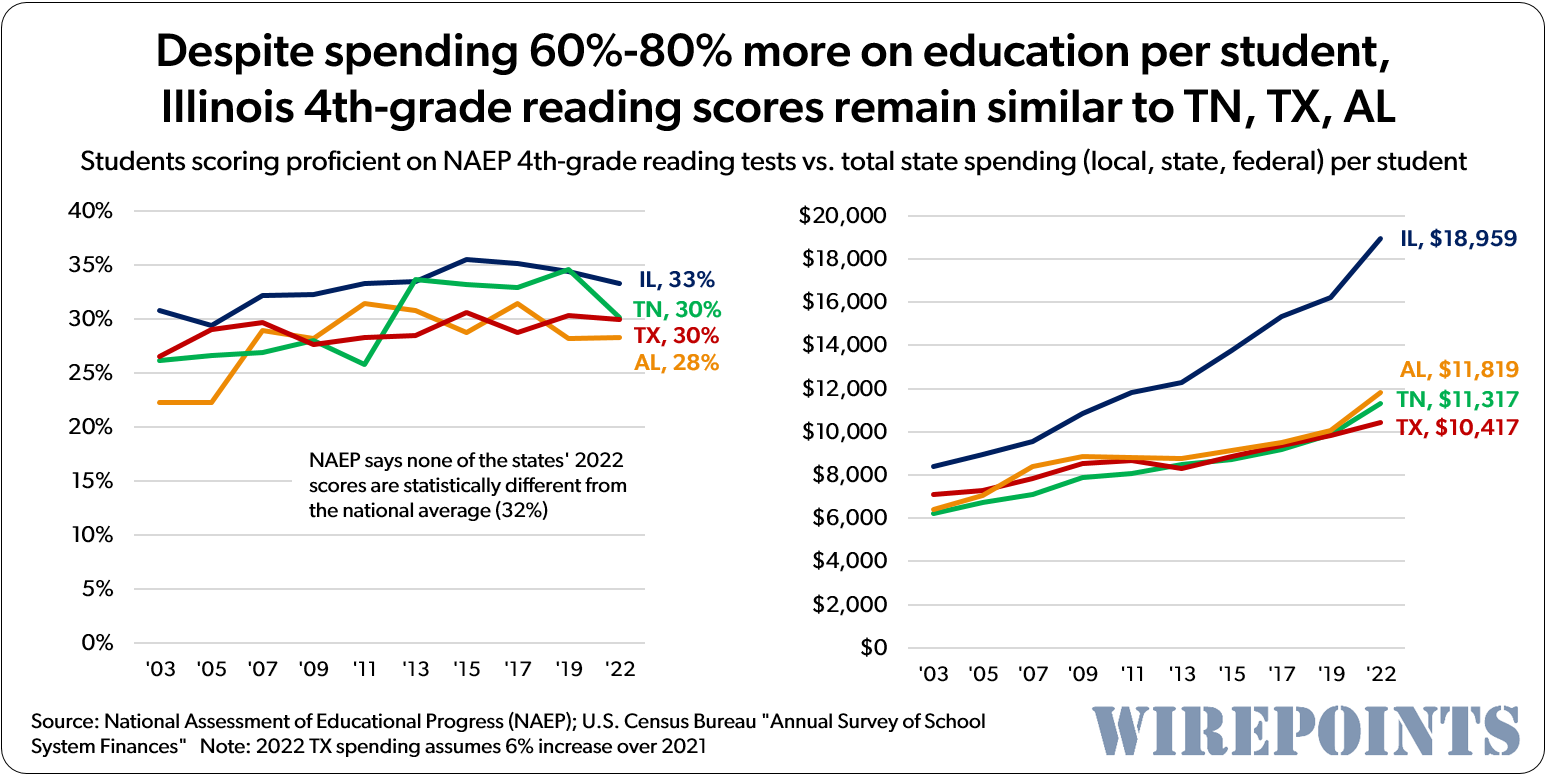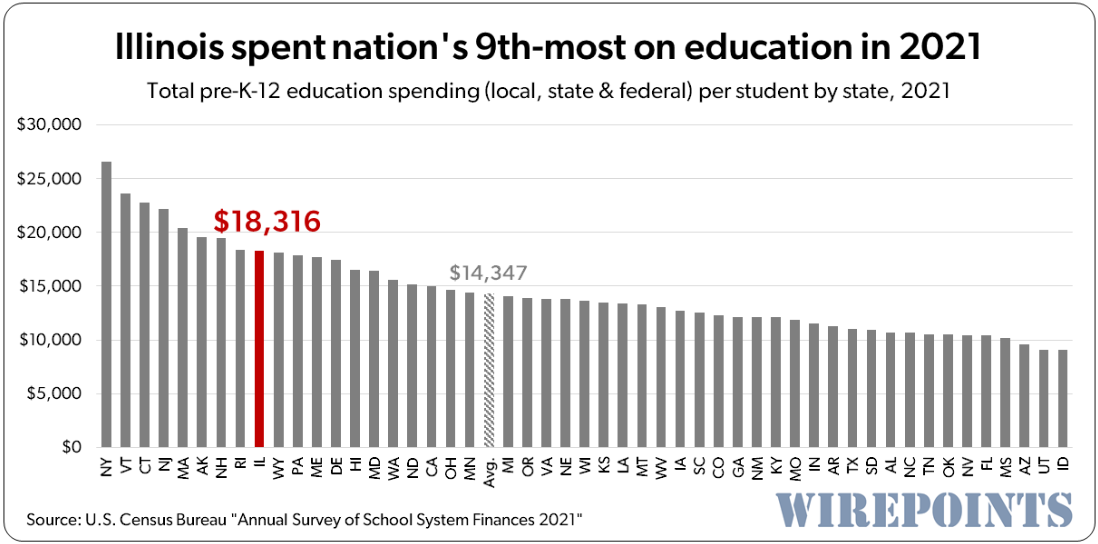By: Ted Dabrowski and John Klingner
We recently highlighted that Alabama will become the nation’s next state to offer school choice to all of its students. By 2027, any student, regardless of race or income, will be able to access an education savings account (ESA) worth $7,000 for use at the school of their choice. That state’s move toward educational freedom stands in sharp contrast to what happened in Illinois late last year when Gov. Pritzker and his Democratic supermajority allies, along with the unions, allowed the state’s only school choice program to die.
Unsurprisingly, some in social media scoffed at Alabama for being a Southern state and hence, delivering the stereotypical poor student outcomes. They also poked fun at Tennessee and Texas, two other states we reported that are taking steps forward on school choice.
But what those detractors don’t know is that Tennessee, Texas and Alabama have 4th-grade reading results roughly on par with Illinois, even though Illinois spends 60% to 80% more per student than those states.
According to the NAEP, also called the Nation’s Report Card, all four states including Illinois are not significantly different in their 2022 4th-grade reading scores compared to the nation’s average of 32%. In other words, they are all statistically the same. The numbers are largely similar across math, too.
Spending is a far different story. Illinois’ operating spending per student was nearly $19,000 in 2022 compared to Alabama’s $11,800 and Texas’ $10,400. Illinois taxpayers are paying far, far more for students to achieve the same results.
More choice, not more spending
One more thing to point out is that the states’ results above – where just 3 out every 10 children are proficient in reading – are absolutely dismal and require real solutions to change.
Illinois education officials only offer one fix: even more spending. Most recently, Chicago Teachers Union President Stacey Davis warned the union’s contract demands could top $50 billion in an attempt to spur a “cultural transformation” across Chicago Public Schools. Never mind that the district already spends more than $29,000 per student, all-in. And never mind that the state already spends the 9th-most per student in the country.
Tennessee, Texas and Alabama, along with a growing number of other states across the nation, have a far different solution: give all students – including minorities – more options than just their failing public schools.
Read more from Wirepoints:
- Illinois lawmakers’ killing of school choice looking more absurd as Alabama, Tennessee, Texas set up choice expansions
- What literacy crisis at Chicago Public Schools? Illinois State Rep. Buckner says he can read ‘very well.’
- Get ready for the Chicago Teachers Union’s radical, expensive agenda in its upcoming contract negotiations
- Cost? ‘Stop asking that question,’ says Chicago Teachers Union president Stacy Davis Gates in strident speech about contract demands
- Chicago Public Schools’ twisted goal: End selective enrollment schools while keeping nearly empty, failing schools open





 The bill passed despite their votes in response to certain incidents where local prosecutors are thought to have been too lenient with non-citizens assaulting cops.
The bill passed despite their votes in response to certain incidents where local prosecutors are thought to have been too lenient with non-citizens assaulting cops. The Wall Street Journal Editorial Board cited Wirepoints’ analysis of Chicago student proficiency data in their latest piece condemning the Chicago Teachers Union’s outrageous contract demands…all while a vast majority of Chicago’s children graduate unable to read at grade level.
The Wall Street Journal Editorial Board cited Wirepoints’ analysis of Chicago student proficiency data in their latest piece condemning the Chicago Teachers Union’s outrageous contract demands…all while a vast majority of Chicago’s children graduate unable to read at grade level. Ted joined Tom Miller of WJPF to talk about the details of Gov. Pritzker’s proposed $52 billion budget, why the state is struggling now that federal covid dollars have run out, the controversy surrounding Tier 2 government pensions, why Illinois’ expensive education system fails to teach children to read, the outrageous demands of the Chicago Teachers Union, and more.
Ted joined Tom Miller of WJPF to talk about the details of Gov. Pritzker’s proposed $52 billion budget, why the state is struggling now that federal covid dollars have run out, the controversy surrounding Tier 2 government pensions, why Illinois’ expensive education system fails to teach children to read, the outrageous demands of the Chicago Teachers Union, and more.
How do these states pay for education? Doesn’t seem to be tied to property taxes and that’s a major problem with Illinois. Changing the method of paying for public schools seems like it would have a positive ripple effect on real estate values and reduced taxes for property owners. I’ll have to take a look at how these states pay for public education, maybe it is nothing more that a shell game, but I don’t think so.
I’m most impressed with what NC is doing with ‘choice’, making private education doable for many more families. The parochial schools there are growing like crazy from all the relocators out of the NE and Midwest – they can’t build fast enough it seems. IL can’t hold a candle to NC in any area of education that’s based on accomplishment.
North Carolina is doing a great turnaround since 2010.
Stop voting democrat, they are intentionally making kids dumb so they will hopefully be future democrat voters.
Also worth pointing out that progressive darling Minnesota scored a 32 (only one notch below IL) yet spends approx. $3,500 less per pupil than Illinois.
So it goes beyond red state/blue state and school choice/no choice. We’re simply not getting the bang for the buck return from our K-12 investment as other states.
And I’m sure TX, TN, AL have a tinny fraction of pension debt per capita compared to Chi/Ill
The difference between Illinois and Tennessee is… Illinois will someday need Washington to save it, while Tennessee just wants Washington to leave it alone.
FYI: Tennessee doesn’t have a pension crisis.
Once again folks; do not confuse a Democratic Party jobs program and slush fund with education.
My small Tennessee city is building a new high school due to a growing population. The roads are in good shape. We have a nice library. My property tax is $1,900 annually (home value $300,000). (Tennessee has no state income tax.) Hopefully, reading and math scores will improve in Tennessee as school choice becomes widely available. In general, things here in Tennessee are moving in a positive direction. If you live in Illinois and think the other states are just as bad, you are simply wrong. Exercise your right as an American to find the best state to raise your… Read more »
To many politicians filling their own pockets in Ill to worry about the people!!!